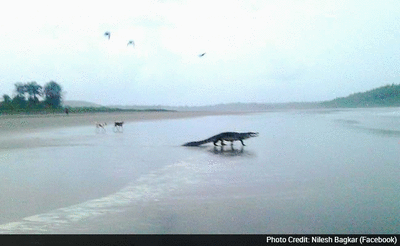However, bird relatives not withstanding, the crocodile is a reptile. Ectothermic, they gain heat or lose heat from their surroundings. When cold and needing to warm up they bask in the sun. This is the most common way of seeing them. Lying in the sun or a hot rock. Sometimes they open their mouths. This is their way of releasing heat. They can't sweat. Most of their time is spent in the water.
On Thursday, the Forest Department in Goa, confirmed that a crocodile had indeed been spotted by a local resident on Morjim beach. Nilesh Bagkar was on his morning walk when he saw the crocodile walking towards the sea. His photographs quickly took over Facebook sites and Twitter with many asking if the photos were real. Understandable, really, as crocodiles usually don't walk the beaches of Goa. We are all grateful for this fact.

As this beach is on the West coast of India, we can all also be glad of the fact that the crocodile was most probably a mugger, and not a salt water crocodile.
If it had been a saltie, wildlife enthusiasts would have cheered to see it making a comeback from areas where it was extirpated while also avoiding the water like the plague for a while. Personally, a shark sighting would not prevent me from going into the ocean, but the sighting of a saltie most certainly will. Why, you ask? Well sharks do not see me as prey. Most attacks are accidental and more rare than lightning strikes. Crocodiles, on the other hand, do so see me as potential prey, especially salties who are aggressive and territorial. A saltie in 2010 killed a woman diver near Andamans' Havelock Island. Open ocean attacks are rare, but dozens of people are killed in India in West Bengal and Odisha every year by salt water crocodiles in estuaries and swamps, especially after monsoon flooding
Muggers, on the other hand are fresh water crocodiles, also called "marsh crocodiles". While there have been some recorded attacks on humans, for the most part, they are timid and stay away. Sometimes they are found in coastal swamps. This particular crocodile probably got too close to the mouth of the Chapora River near Morjim, either because of strong currents, or floods created by the monsoons, and then swam with the flow of fresh water down into the sea and further down the beach.
Crocodiles can instinctively sense and smell water, and will move towards it. If there is a situation of unusual drought with no water bodies, or only dried up water bodies nearby and a hot summer with arid conditions, the crocodile can enter a state called aestivation. It is similar to hibernation. The crocodile will bury itself into a sand tunnel and go into stasis, lowering its metabolic rate and preventing dedication and over-heating. Some crocodiles have been recorded in this state for over two years.
Muggers are one of three species of crocodiles found in India, the salt water croc and the gharial being the other two species found in India. While found in greater numbers than the other two, populations are still small and classified as vulnerable.
Being scaly and cold-blooded, we don't want to cuddle them. Who mourns the death of a crocodile? Mugger populations in the wild have crashed due to poaching and pollution in our river systems. Fishermen see them as a threat to the fish they catch and as a threat to their own lives. They also eat birds. In fact, they use sticks, which they place on the top of their heads while lying low in the water, luring in birds looking to build nests. This shows tool use and remarkable intelligence.
Most importantly, as apex predators of their ecosystem, they are crucial to the health of a river or estuary ecosystem.
This beach croc will survive in salt water for a while but being a fresh water animal, it will need to get back to the river. Muggers are less aggressive than salties and chances of it attacking a swimmer are very low unless it's trapped in the area and starts getting hungry. With the ability to swim at 50 kms an hour, this one will be back in his river soon. In the meantime, caution would be good for a few days. Swim with a friend. If you see fresh drag marks on the sand, don't go into the ocean. In a few days, if it is not spotted again, the beach is back to being ours. Sometimes, let's appreciate the fact that we do share it with other fellow beings.
(Swati Thiyagarajan is a senior special correspondent with NDTV.)
Disclaimer: The opinions expressed within this article are the personal opinions of the author. The facts and opinions appearing in the article do not reflect the views of NDTV and NDTV does not assume any responsibility or liability for the same.


